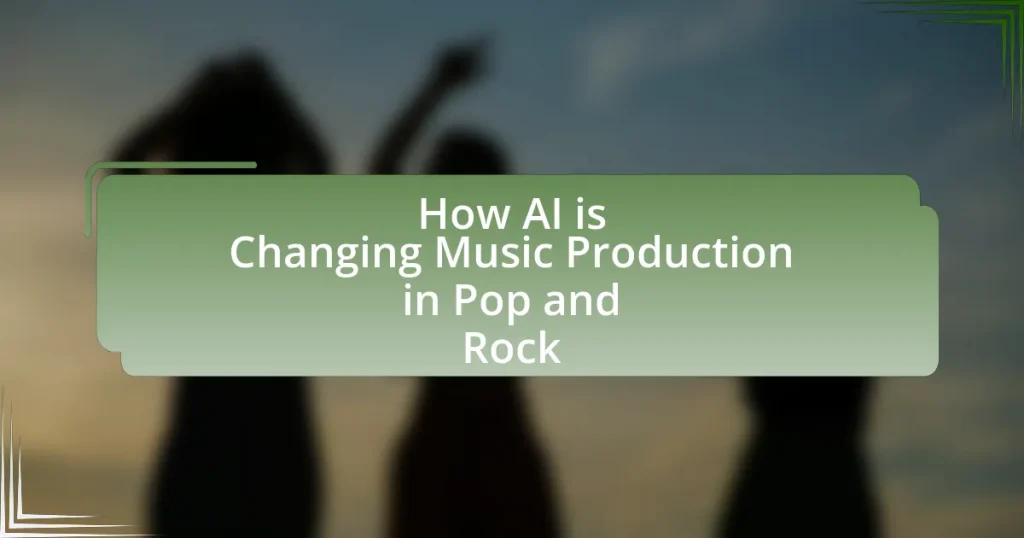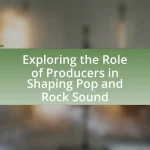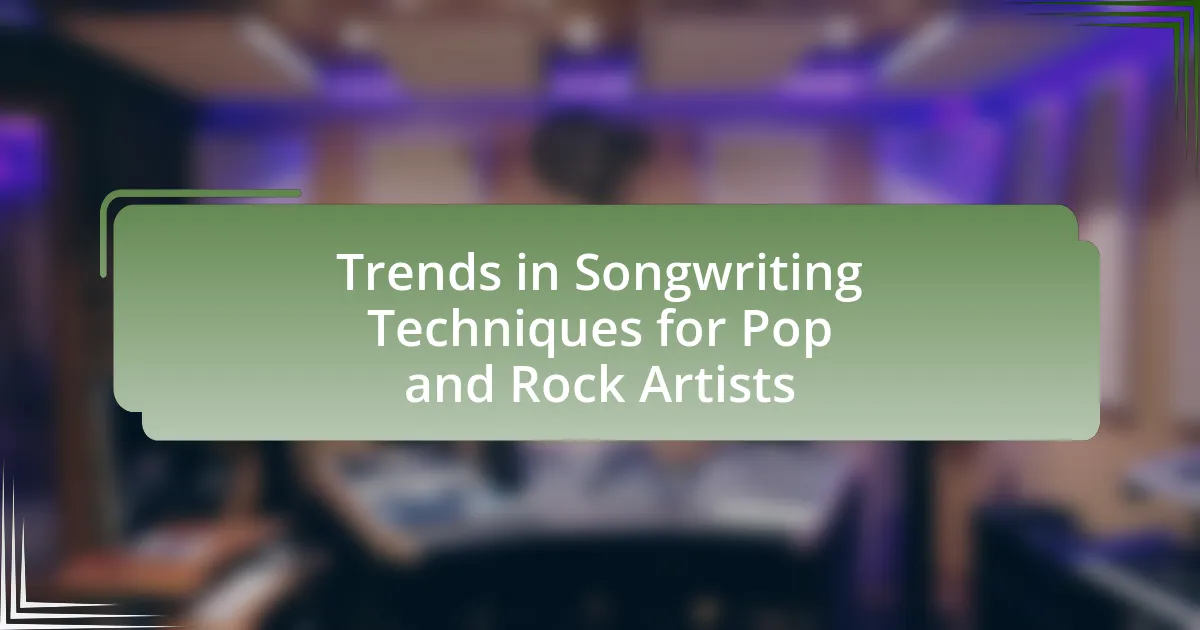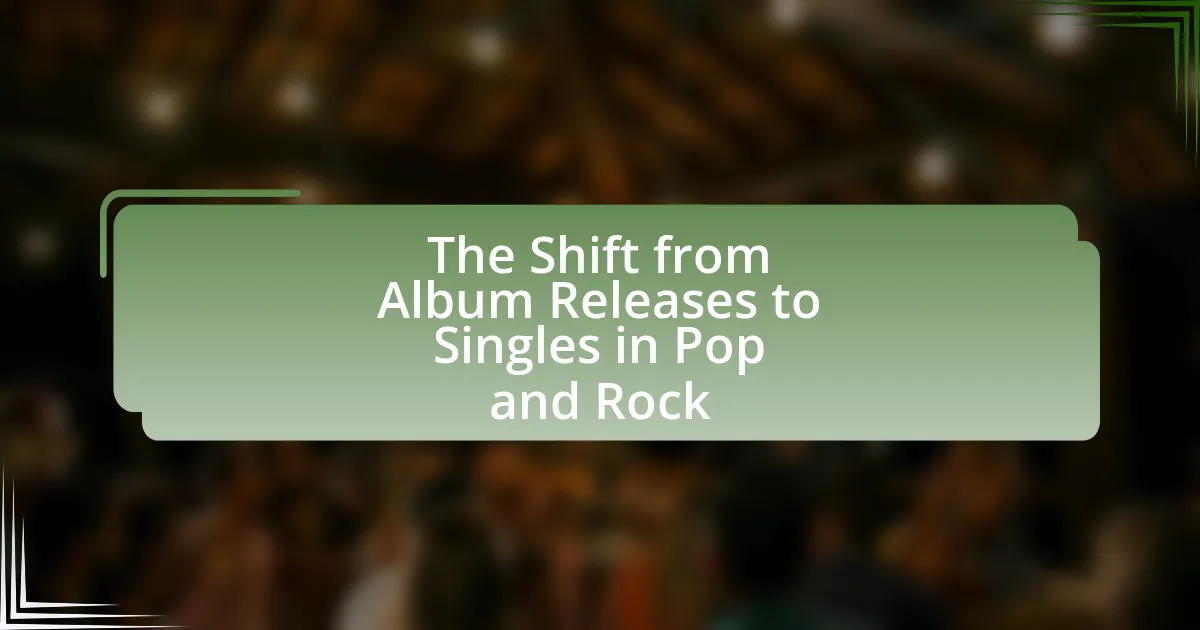AI is significantly transforming music production in pop and rock by automating creative processes, enhancing sound design, and personalizing music experiences. Key technologies driving this change include machine learning algorithms, neural networks, and natural language processing, which facilitate the generation of original compositions and assist in songwriting. The integration of AI tools allows artists and producers to streamline workflows, improve efficiency, and maintain creative control while navigating challenges related to copyright and job displacement. As AI continues to evolve, it is expected to further influence the sound and style of future music, offering innovative solutions for artists in their creative endeavors.
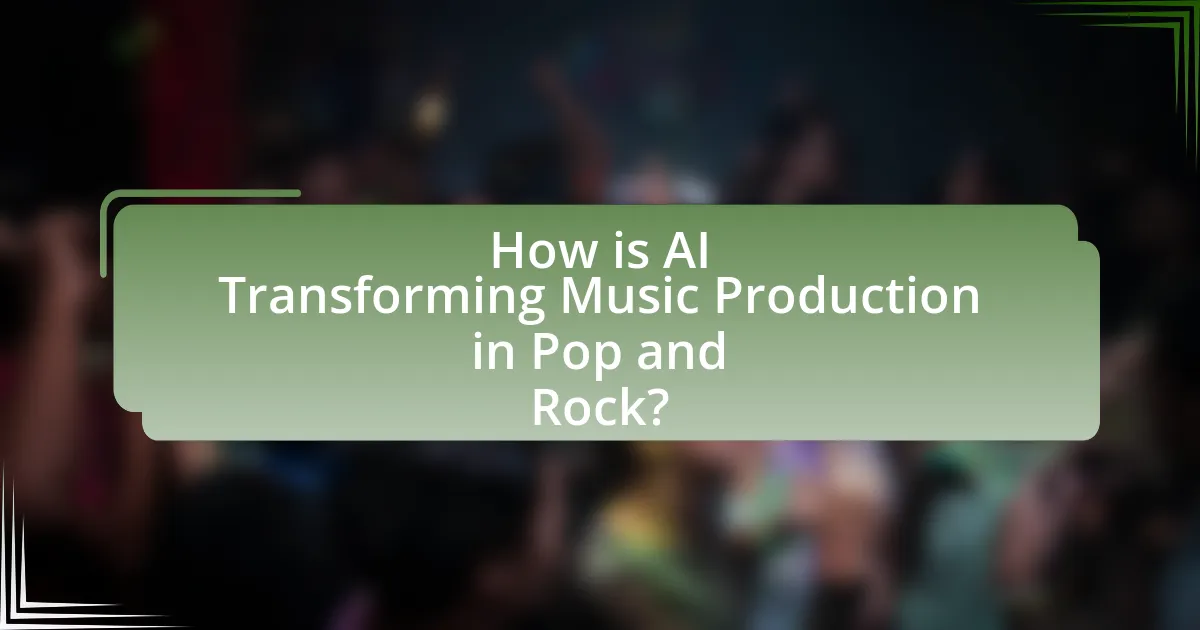
How is AI Transforming Music Production in Pop and Rock?
AI is transforming music production in pop and rock by automating various aspects of the creative process, enhancing sound design, and facilitating personalized music experiences. For instance, AI algorithms can analyze vast amounts of data to identify trends and generate melodies, enabling producers to create music that resonates with current listener preferences. Additionally, tools like OpenAI’s MuseNet and Google’s Magenta allow artists to experiment with new sounds and styles, pushing the boundaries of traditional music production. The integration of AI in music production has led to increased efficiency, allowing artists to focus more on creativity while AI handles repetitive tasks, such as mixing and mastering tracks. This shift is evidenced by the growing number of artists and producers adopting AI-driven software, which has become a staple in modern studios.
What are the key technologies driving AI in music production?
Key technologies driving AI in music production include machine learning algorithms, neural networks, and natural language processing. Machine learning algorithms analyze vast datasets of music to identify patterns and generate new compositions, while neural networks, particularly deep learning models, enhance sound synthesis and audio processing by mimicking human cognitive functions. Natural language processing enables AI to understand and generate lyrics, facilitating collaboration between artists and technology. These technologies have been validated through their application in platforms like Amper Music and AIVA, which utilize AI to create original music tracks, demonstrating their effectiveness in the music production landscape.
How do machine learning algorithms enhance music creation?
Machine learning algorithms enhance music creation by analyzing vast datasets of musical compositions to identify patterns and generate new musical ideas. These algorithms can learn from existing music styles, enabling them to create original melodies, harmonies, and rhythms that mimic or innovate upon established genres. For instance, OpenAI’s MuseNet can compose music in various styles by training on a diverse range of musical pieces, demonstrating the capability of machine learning to produce coherent and stylistically relevant music. This application of machine learning not only streamlines the creative process for artists but also opens up new avenues for experimentation and collaboration in music production.
What role does natural language processing play in songwriting?
Natural language processing (NLP) plays a significant role in songwriting by enabling the analysis and generation of lyrics through algorithms that understand and manipulate language. NLP tools can analyze vast datasets of existing songs to identify patterns in themes, rhymes, and structures, which can inspire new compositions. For instance, AI models like OpenAI’s GPT-3 have been used to generate original lyrics based on specific prompts, showcasing the ability of NLP to assist songwriters in overcoming creative blocks and exploring new lyrical ideas. This application of NLP not only enhances creativity but also streamlines the songwriting process, making it more efficient and innovative.
Why is AI becoming essential in modern music production?
AI is becoming essential in modern music production due to its ability to enhance creativity, streamline workflows, and provide data-driven insights. By utilizing machine learning algorithms, AI can analyze vast amounts of musical data, enabling producers to identify trends and generate new ideas that align with current listener preferences. For instance, AI tools like Amper Music and AIVA allow musicians to compose original tracks quickly, reducing the time spent on repetitive tasks. Additionally, a study by the Music Industry Research Association found that AI-driven analytics can predict hit songs with up to 80% accuracy, demonstrating its significant impact on decision-making in music production.
What advantages does AI offer to producers and artists?
AI offers producers and artists enhanced creativity, efficiency, and data-driven insights. By utilizing AI algorithms, producers can generate new musical ideas, automate repetitive tasks, and analyze audience preferences to tailor their work. For instance, AI tools like Amper Music and AIVA allow artists to compose music quickly, enabling them to focus on the creative aspects of production. Additionally, AI can analyze vast amounts of data from streaming platforms, providing insights into trends and listener behavior, which helps artists make informed decisions about their music and marketing strategies. This integration of AI in music production not only streamlines workflows but also opens up new avenues for artistic expression.
How does AI improve efficiency in the music production process?
AI improves efficiency in the music production process by automating repetitive tasks, enhancing creativity, and optimizing workflows. For instance, AI algorithms can analyze vast amounts of data to suggest chord progressions, melodies, and arrangements, significantly reducing the time spent on composition. Additionally, AI-driven tools can assist in mixing and mastering by providing real-time feedback and adjustments, which streamlines the production timeline. Research indicates that AI can cut production time by up to 30%, allowing artists and producers to focus more on creative aspects rather than technical details.
What challenges does AI present in music production?
AI presents several challenges in music production, including issues of creativity, copyright, and the potential for job displacement. The reliance on AI can lead to homogenized sound, as algorithms often replicate existing patterns rather than fostering innovation. Additionally, copyright concerns arise when AI-generated music may inadvertently infringe on existing works, complicating ownership and licensing. Furthermore, the automation of tasks traditionally performed by human producers raises fears of job loss within the industry, as AI tools become more capable of handling complex production processes. These challenges highlight the need for careful consideration of AI’s role in the evolving landscape of music production.
How can artists maintain creative control with AI tools?
Artists can maintain creative control with AI tools by setting clear parameters for the AI’s role in their creative process. By defining specific tasks for AI, such as generating ideas or assisting with sound design, artists can ensure that the final output aligns with their vision. For instance, using AI to analyze trends while retaining the decision-making power allows artists to blend innovation with personal style. Research indicates that artists who actively engage with AI as a collaborative tool, rather than a replacement, report higher satisfaction in their creative outcomes. This approach fosters a partnership where the artist’s unique voice remains central, thus preserving their creative integrity.
What ethical considerations arise from using AI in music?
The ethical considerations arising from using AI in music include issues of copyright, authorship, and the potential for bias in AI-generated content. Copyright concerns stem from the fact that AI can create music that closely resembles existing works, leading to questions about ownership and infringement. Authorship issues arise when determining who should be credited for AI-generated music, as traditional notions of creativity and individual contribution are challenged. Additionally, bias can manifest in AI algorithms, which may reflect the limitations of the data they are trained on, potentially perpetuating stereotypes or excluding diverse musical styles. These considerations highlight the need for clear guidelines and policies to address the implications of AI in the music industry.
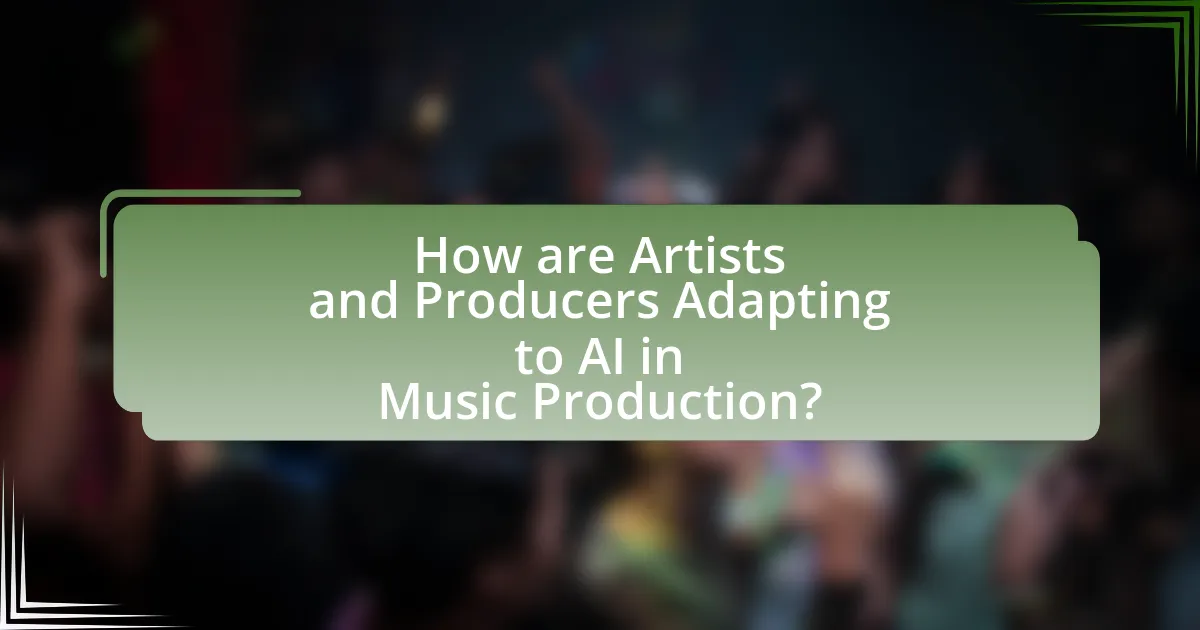
How are Artists and Producers Adapting to AI in Music Production?
Artists and producers are adapting to AI in music production by integrating AI tools for composition, sound design, and mixing processes. These tools enable musicians to generate new melodies, harmonies, and beats, enhancing creativity and efficiency. For instance, platforms like Amper Music and AIVA allow users to create music by inputting parameters, which streamlines the production process. Additionally, AI algorithms analyze vast amounts of data to predict trends and assist in mastering tracks, ensuring a polished final product. This shift is evidenced by the increasing use of AI in popular music, with artists like Taryn Southern releasing albums co-created with AI technologies, demonstrating the growing acceptance and reliance on AI in the industry.
What skills do producers need to work effectively with AI?
Producers need a combination of technical proficiency, data analysis skills, and creative adaptability to work effectively with AI in music production. Technical proficiency includes understanding AI tools and software used in music creation, such as machine learning algorithms and digital audio workstations that integrate AI features. Data analysis skills are essential for interpreting AI-generated insights and trends in music preferences, enabling producers to make informed decisions. Creative adaptability allows producers to blend traditional music production techniques with AI capabilities, fostering innovation in sound design and composition. These skills are crucial as AI continues to influence the landscape of pop and rock music production, enhancing efficiency and creativity.
How can traditional music production techniques integrate with AI?
Traditional music production techniques can integrate with AI by utilizing machine learning algorithms to analyze and enhance audio recordings, thereby improving sound quality and creative possibilities. For instance, AI can assist in mixing and mastering by automatically adjusting levels and applying effects based on learned patterns from successful tracks. Additionally, AI-driven tools can generate musical ideas or suggest arrangements that complement traditional methods, allowing producers to explore new creative avenues while maintaining their established workflows. This integration is supported by advancements in AI technology, such as Google’s Magenta project, which demonstrates how AI can collaborate with musicians to create innovative compositions.
What training resources are available for learning AI tools?
Training resources for learning AI tools include online courses, tutorials, and documentation. Platforms such as Coursera, edX, and Udacity offer specialized courses on AI and machine learning, often created by leading universities and industry experts. Additionally, websites like GitHub provide access to open-source projects and code repositories that can enhance practical understanding. Documentation from AI frameworks like TensorFlow and PyTorch serves as essential resources for learning the technical aspects of AI tool implementation. These resources are widely recognized for their effectiveness in educating users about AI technologies and applications.
How are artists collaborating with AI technologies?
Artists are collaborating with AI technologies by integrating machine learning algorithms into their creative processes, enabling them to generate new sounds, compose music, and enhance production techniques. For instance, platforms like OpenAI’s MuseNet and Google’s Magenta allow musicians to experiment with AI-generated compositions, providing inspiration and expanding their creative possibilities. Additionally, AI tools are being used for tasks such as mixing and mastering, where algorithms analyze audio tracks to optimize sound quality, thus streamlining the production workflow. This collaboration not only enhances artistic expression but also democratizes music creation, allowing artists with varying levels of technical expertise to leverage advanced tools in their work.
What examples exist of successful AI collaborations in pop and rock?
Successful AI collaborations in pop and rock include the partnership between the British band Coldplay and the AI music platform AIVA, which helped create the song “The Last Goodbye.” Additionally, the song “Break Free” by Ariana Grande features AI-generated elements that enhance its production. Another notable example is the collaboration between the electronic music producer Grimes and the AI tool Endel, which generated soundscapes for her album “Miss Anthropocene.” These collaborations demonstrate how AI can contribute creatively to music production, enhancing both the songwriting process and the overall sound.
How do artists perceive the impact of AI on their creative process?
Artists perceive the impact of AI on their creative process as both a tool for enhancement and a source of concern regarding authenticity. Many artists appreciate AI’s ability to streamline tasks, generate new ideas, and assist in music production, allowing them to focus more on the artistic aspects of their work. For instance, AI algorithms can analyze vast amounts of data to suggest chord progressions or melodies, which can inspire artists and lead to innovative compositions. However, some artists express apprehension that reliance on AI may dilute the human element of creativity, fearing that it could lead to homogenized music lacking emotional depth. This dual perception highlights the ongoing debate within the artistic community about the balance between leveraging technology and preserving individual artistic expression.
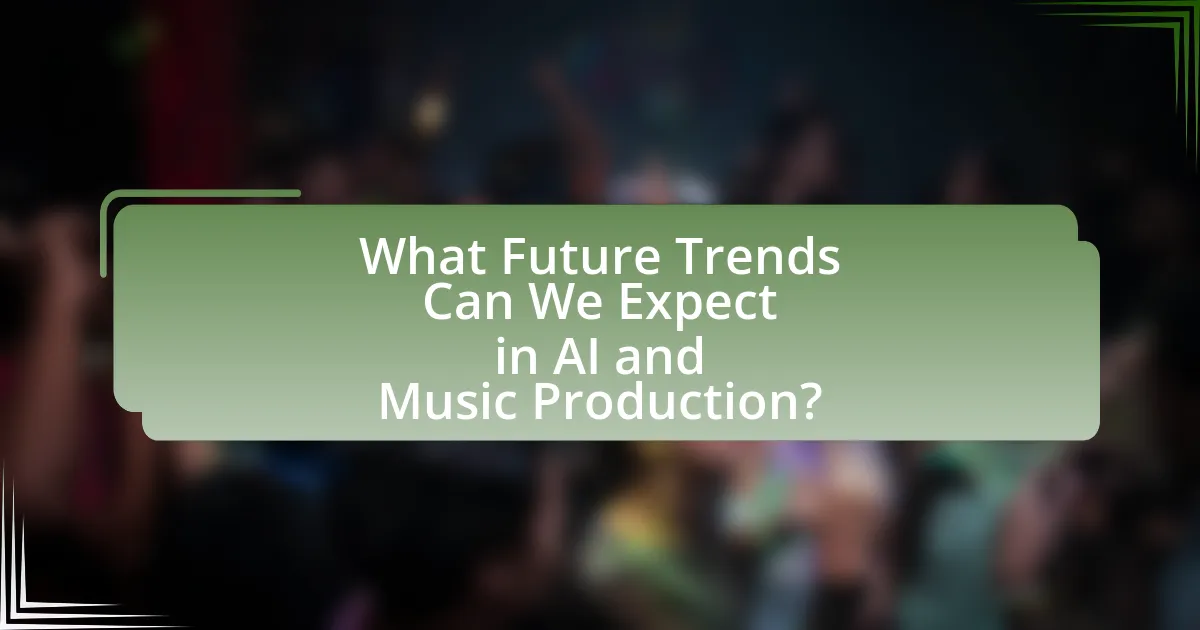
What Future Trends Can We Expect in AI and Music Production?
Future trends in AI and music production will likely include enhanced collaboration between AI and human musicians, personalized music experiences, and advanced generative algorithms. AI tools are increasingly being used to assist in songwriting, arrangement, and mixing, allowing artists to explore new creative avenues. For instance, platforms like Amper Music and AIVA enable users to create unique compositions by leveraging AI’s ability to analyze vast amounts of musical data. Additionally, AI-driven recommendation systems will continue to refine how listeners discover music, tailoring suggestions based on individual preferences and listening habits. As AI technology evolves, its integration into music production will become more seamless, fostering innovation in genres like pop and rock.
How will AI continue to evolve in the music industry?
AI will continue to evolve in the music industry by enhancing music creation, personalization, and distribution processes. Advanced algorithms will enable AI to analyze vast amounts of musical data, leading to the generation of new compositions that reflect current trends and listener preferences. For instance, AI tools like OpenAI’s MuseNet and Google’s Magenta have already demonstrated the ability to compose original music across various genres, indicating a shift towards AI-assisted songwriting. Additionally, AI-driven platforms will increasingly personalize music recommendations, improving user engagement by analyzing listening habits and preferences. According to a report by the International Federation of the Phonographic Industry (IFPI), 70% of music consumers are influenced by algorithmic recommendations, showcasing the growing impact of AI in shaping music consumption.
What innovations are on the horizon for AI in music production?
Innovations on the horizon for AI in music production include advanced algorithms for real-time music composition, enhanced audio analysis for mixing and mastering, and AI-driven tools for personalized music recommendations. These developments are driven by the increasing capability of machine learning models to analyze vast datasets of music, enabling them to generate original compositions that mimic various styles and genres. For instance, companies like OpenAI and Google are developing AI systems that can create music tracks based on user inputs, significantly streamlining the creative process. Additionally, AI tools are being designed to assist sound engineers by providing intelligent suggestions for sound adjustments, thereby improving the overall production quality.
How might AI influence the sound and style of future pop and rock music?
AI will significantly influence the sound and style of future pop and rock music by enabling artists to create innovative compositions and enhance production techniques. Through machine learning algorithms, AI can analyze vast amounts of musical data, identifying trends and generating new melodies, harmonies, and rhythms that may not have been conceived by human composers. For instance, AI tools like OpenAI’s MuseNet and Google’s Magenta have already demonstrated the ability to compose original music across various genres, including pop and rock, showcasing their potential to reshape musical creativity. Additionally, AI can assist in sound design, allowing for the creation of unique audio textures and effects that can redefine the sonic landscape of these genres. This technological integration is likely to lead to a more diverse and experimental approach in pop and rock music, as artists leverage AI to push creative boundaries.
What practical tips can artists use to leverage AI in their music production?
Artists can leverage AI in their music production by utilizing AI-driven tools for composition, sound design, and mixing. For instance, platforms like Amper Music and AIVA allow artists to generate original compositions based on user-defined parameters, enhancing creativity and efficiency. Additionally, AI software such as LANDR can automate the mastering process, providing professional-quality sound without the need for extensive technical knowledge. Research indicates that AI can analyze vast amounts of music data to identify trends and preferences, enabling artists to tailor their work to audience demands. By integrating these AI tools, artists can streamline their workflow, enhance their creative output, and stay competitive in the evolving music landscape.
How can artists choose the right AI tools for their needs?
Artists can choose the right AI tools for their needs by assessing their specific creative goals and the functionalities offered by various AI applications. For instance, artists should identify whether they require tools for composition, sound design, mixing, or mastering, as different AI tools specialize in these areas. Research indicates that tools like AIVA and Amper Music excel in composition, while LANDR is recognized for mastering. Additionally, artists should consider user-friendliness, integration with existing software, and community support, as these factors significantly impact the effectiveness of the tools in enhancing their creative process.
What best practices should artists follow when integrating AI into their workflow?
Artists should prioritize collaboration with AI tools to enhance creativity and efficiency in their workflow. By using AI for tasks such as generating ideas, composing music, or analyzing trends, artists can streamline their creative process while maintaining their unique artistic voice. For instance, a study by the University of California, Berkeley, found that musicians who integrated AI into their composition process reported a 30% increase in productivity and a broader range of creative outputs. Additionally, artists should remain transparent about their use of AI, ensuring that audiences understand the role it plays in their work, which fosters trust and engagement.
